Review: Gildersleeve’s Ghost (1944)
One thing you can say about Throckmorton P. Gildersleeve (Harold Peary): his political ambitions are boundless, and in the 1944 film comedy Gildersleeve’s Ghost he’s determined to advance from his present position as Summerfield’s water commissioner to Summerfield’s police commissioner. It’s not proving to be an easy task; the current man in the job, Commissioner Haley (Emory Parnell), has been there for a dozen years and though Gildy is trying his best he’s lagging behind in the polls.
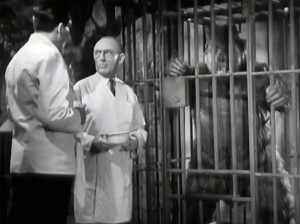 But The Great Man gets an otherworldly assist from the spirits of two of his ancestors: Randolph Q, Gildersleeve and his nephew Jonathan (both played by Peary). The ghostly Gildersleeves know that at nearby Wagstaff Manor, dotty scientist Dr. John Wells (Frank Reicher) is working on an experiment involving invisibility—once perfected, he’ll use it on a gorilla subject (the first of many more to come) to create an invincible army. Wells and assistant Lennox (Joseph Vitale) have already tested the formula on a chorus girl named Terry Vance (Marion Martin), who has a tendency to appear and reappear at various times. Randolph and Jonathan hatch a plan whereupon they’ll let the gorilla out of his cage to terrorize Summerfield…and Gildy will naturally step up to the plate to capture the beast, thus ensuring his election win.
But The Great Man gets an otherworldly assist from the spirits of two of his ancestors: Randolph Q, Gildersleeve and his nephew Jonathan (both played by Peary). The ghostly Gildersleeves know that at nearby Wagstaff Manor, dotty scientist Dr. John Wells (Frank Reicher) is working on an experiment involving invisibility—once perfected, he’ll use it on a gorilla subject (the first of many more to come) to create an invincible army. Wells and assistant Lennox (Joseph Vitale) have already tested the formula on a chorus girl named Terry Vance (Marion Martin), who has a tendency to appear and reappear at various times. Randolph and Jonathan hatch a plan whereupon they’ll let the gorilla out of his cage to terrorize Summerfield…and Gildy will naturally step up to the plate to capture the beast, thus ensuring his election win.
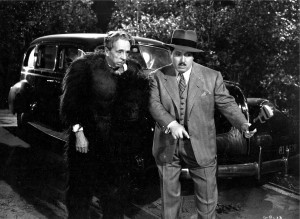 To paraphrase an observation often made on his radio program…this looks like it’s going to be one of Gildersleeve’s bad days. Gildy has his hands full trying to convince his druggist pal Peavey (Richard LeGrand) and Paley that there actually is an ape. A series of mishaps result in those three men—along with Gildy’s niece Marjorie (Margie Stewart), nephew Leroy (Freddie Mercer) and housekeeper Birdie Lee Coggins (Lillian Randolph)—having to spend the night in Wagstaff Manor. There, Wells and Terry prove quite successful in convincing Throcky’s family and friends that the cheese has slid off his cracker.
To paraphrase an observation often made on his radio program…this looks like it’s going to be one of Gildersleeve’s bad days. Gildy has his hands full trying to convince his druggist pal Peavey (Richard LeGrand) and Paley that there actually is an ape. A series of mishaps result in those three men—along with Gildy’s niece Marjorie (Margie Stewart), nephew Leroy (Freddie Mercer) and housekeeper Birdie Lee Coggins (Lillian Randolph)—having to spend the night in Wagstaff Manor. There, Wells and Terry prove quite successful in convincing Throcky’s family and friends that the cheese has slid off his cracker.
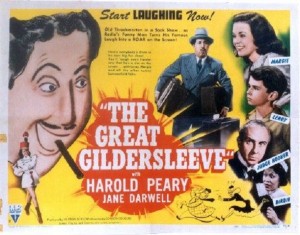 Old-time radio fans know that before Hal Peary went off on his own in the sitcom spin-off The Great Gildersleeve, he was a regular on Fibber McGee & Molly as the obstreperous neighbor of the McGees. But the Gildersleeve character was too popular just to be contained at 81 Wistful Vista. Peary played Throckmorton in a number of feature films: Comin’ Round the Mountain (1940—as Mayor Gildersleeve!), County Fair (1941), and a movie reviewed previously here on the blog, Seven Days’ Leave (1942). He also appears in the Fibber & Molly/Bergen & McCarthy vehicles Look Who’s Laughing [1941] and Here We Go Again [1942]—even though he had already relocated to Summerfield by then. The success of all these films inspired RKO to institute a series of B-films with Hal as his popular character, beginning with the appropriately titled The Great Gildersleeve in 1942.
Old-time radio fans know that before Hal Peary went off on his own in the sitcom spin-off The Great Gildersleeve, he was a regular on Fibber McGee & Molly as the obstreperous neighbor of the McGees. But the Gildersleeve character was too popular just to be contained at 81 Wistful Vista. Peary played Throckmorton in a number of feature films: Comin’ Round the Mountain (1940—as Mayor Gildersleeve!), County Fair (1941), and a movie reviewed previously here on the blog, Seven Days’ Leave (1942). He also appears in the Fibber & Molly/Bergen & McCarthy vehicles Look Who’s Laughing [1941] and Here We Go Again [1942]—even though he had already relocated to Summerfield by then. The success of all these films inspired RKO to institute a series of B-films with Hal as his popular character, beginning with the appropriately titled The Great Gildersleeve in 1942.
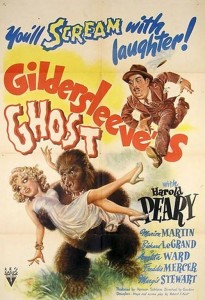 Gildersleeve’s Ghost was the last of these “Gildersleeve” romps, and was directed by Gordon Douglas—who helmed all four programmers in the Gildy franchise. Douglas began his movie career as a child actor and worked at Hal Roach Studios for a number of years, as both a gag writer and directing shorts in the Our Gang series (he even helmed the kiddie troupe’s solo foray into feature films, 1936’s General Spanky). Gordon would later go on to sit in the director’s chair on such movies as Kiss Tomorrow Goodbye (1950), Them! (1954) and Robin and the 7 Hoods (1964). Robert E. Kent, who handled story and screenplay duties on the previous Gildersleeve on Broadway (1943—my pick for the best in the series), also tackled the same on Ghost…and later worked on radio-themed movies such as Radio Stars on Parade (1945) and It’s a Joke, Son! (1947).
Gildersleeve’s Ghost was the last of these “Gildersleeve” romps, and was directed by Gordon Douglas—who helmed all four programmers in the Gildy franchise. Douglas began his movie career as a child actor and worked at Hal Roach Studios for a number of years, as both a gag writer and directing shorts in the Our Gang series (he even helmed the kiddie troupe’s solo foray into feature films, 1936’s General Spanky). Gordon would later go on to sit in the director’s chair on such movies as Kiss Tomorrow Goodbye (1950), Them! (1954) and Robin and the 7 Hoods (1964). Robert E. Kent, who handled story and screenplay duties on the previous Gildersleeve on Broadway (1943—my pick for the best in the series), also tackled the same on Ghost…and later worked on radio-themed movies such as Radio Stars on Parade (1945) and It’s a Joke, Son! (1947).
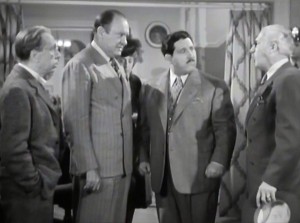 So I’m going to be honest—this movie is not Blithe Spirit. Kent’s screenplay for Ghost is pretty much your standard “scare comedy” material, but it does get a boost from impressive special effects (for a B-picture) and enthusiastic performances from its players. The problem with the Gildersleeve movies is that RKO only availed themselves of three of the principle performers from the radio series: Peary, Legrand and Randolph (who appeared in all four). Child actor Freddie Mercer replaced Walter Tetley as Leeeeeroy in the Gildersleeve movies, and was never really able to convey Tetley’s endearing rambunctiousness as Gildy’s skeptical nephew. (Tetley does make an appearance, however, as a pugnacious bellhop in Broadway.) Margie Stewart is okay as Marjorie (she replaced the actress who played Marj in the previous Gildy romp, Margaret Landry), but she’s certainly no Lurene Tuttle. He’s not billed in the credits, but Earle Ross appears briefly in Ghost in the role he played on the program, Judge Horace Hooker (Hooker was played by Charles Arnt in the first two Gildersleeve films)—possibly making Ghost the winner when it comes to featuring the most performers from the radio incarnation. (Ken Christy, who played Chief Gates on the show, is in a couple of the movies in minor parts and Forrest Lewis, who would play Peavey on the short-lived TV series, is a druggist in Broadway.)
So I’m going to be honest—this movie is not Blithe Spirit. Kent’s screenplay for Ghost is pretty much your standard “scare comedy” material, but it does get a boost from impressive special effects (for a B-picture) and enthusiastic performances from its players. The problem with the Gildersleeve movies is that RKO only availed themselves of three of the principle performers from the radio series: Peary, Legrand and Randolph (who appeared in all four). Child actor Freddie Mercer replaced Walter Tetley as Leeeeeroy in the Gildersleeve movies, and was never really able to convey Tetley’s endearing rambunctiousness as Gildy’s skeptical nephew. (Tetley does make an appearance, however, as a pugnacious bellhop in Broadway.) Margie Stewart is okay as Marjorie (she replaced the actress who played Marj in the previous Gildy romp, Margaret Landry), but she’s certainly no Lurene Tuttle. He’s not billed in the credits, but Earle Ross appears briefly in Ghost in the role he played on the program, Judge Horace Hooker (Hooker was played by Charles Arnt in the first two Gildersleeve films)—possibly making Ghost the winner when it comes to featuring the most performers from the radio incarnation. (Ken Christy, who played Chief Gates on the show, is in a couple of the movies in minor parts and Forrest Lewis, who would play Peavey on the short-lived TV series, is a druggist in Broadway.)
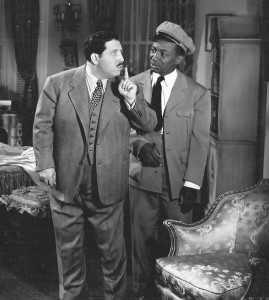 This is just nitpicking, of course; the supporting players in Ghost all turn in solid work—particularly Marion Martin, who plays the “ghostly” Terry. The platinum-tressed Martin, known as “Hollywood’s blonde menace,” could play both comedic and serious roles in such movies as The Man in the Iron Mask (1939), His Girl Friday (1940) and Angel on My Shoulder (1946). As Terry, Martin tries to put the moves on our favorite water commissioner (she’s been told by Wells that if she doesn’t help to convince everyone Gildy is cuckoo-for-Cocoa-Puffs she’ll never be visible again), and Throckmorton continuously rebuffs her advances. (I know—he must not be feeling well.) Nicodemus Stewart also generates more than his fair share of chuckles as Paley’s chauffeur Chauncey (doubling as Birdie’s love interest); Stewart, who must have landed the part because Mantan Moreland and Willie Best were unavailable, is able to work wonders with even the weakest material. (As the two of them explore a secret passageway in the mansion Gildy asks: “You want to go first, Chauncey?” Chauncey: “No, sir—I don’t even want to go second!”) Nick would later play the role of Lightnin’ the janitor in the boob tube version of Amos ‘n’ Andy. His roles in films and TV may have been demeaning, but he was able to use the money he earned to establish the prestigious Ebony Showcase Theatre in Los Angeles in 1950.
This is just nitpicking, of course; the supporting players in Ghost all turn in solid work—particularly Marion Martin, who plays the “ghostly” Terry. The platinum-tressed Martin, known as “Hollywood’s blonde menace,” could play both comedic and serious roles in such movies as The Man in the Iron Mask (1939), His Girl Friday (1940) and Angel on My Shoulder (1946). As Terry, Martin tries to put the moves on our favorite water commissioner (she’s been told by Wells that if she doesn’t help to convince everyone Gildy is cuckoo-for-Cocoa-Puffs she’ll never be visible again), and Throckmorton continuously rebuffs her advances. (I know—he must not be feeling well.) Nicodemus Stewart also generates more than his fair share of chuckles as Paley’s chauffeur Chauncey (doubling as Birdie’s love interest); Stewart, who must have landed the part because Mantan Moreland and Willie Best were unavailable, is able to work wonders with even the weakest material. (As the two of them explore a secret passageway in the mansion Gildy asks: “You want to go first, Chauncey?” Chauncey: “No, sir—I don’t even want to go second!”) Nick would later play the role of Lightnin’ the janitor in the boob tube version of Amos ‘n’ Andy. His roles in films and TV may have been demeaning, but he was able to use the money he earned to establish the prestigious Ebony Showcase Theatre in Los Angeles in 1950.
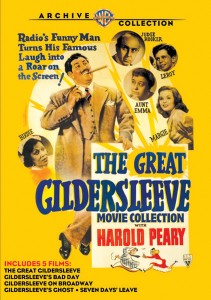 Gildersleeve’s Ghost isn’t anywhere close to high art, but its shortcomings are overcome by its sense of whimsy and fun—it’s available on a 2-DVD collection entitled The Great Gildersleeve Movie Collection, which also contains The Great Gildersleeve, Gildersleeve’s Bad Day (1943), Gildersleeve on Broadway and Seven Days’ Leave. Be sure to check out Radio Spirits’ other Gildy sets featuring his radio adventures in Baby, Marjorie’s Wedding and Neighbors (and special seasonal shows in Happy Halloween and Christmas Radio Classics!). We even have Gildy on TV in Classic TV Comedies of the 50s (Featuring “The Great Gildersleeve”).
Gildersleeve’s Ghost isn’t anywhere close to high art, but its shortcomings are overcome by its sense of whimsy and fun—it’s available on a 2-DVD collection entitled The Great Gildersleeve Movie Collection, which also contains The Great Gildersleeve, Gildersleeve’s Bad Day (1943), Gildersleeve on Broadway and Seven Days’ Leave. Be sure to check out Radio Spirits’ other Gildy sets featuring his radio adventures in Baby, Marjorie’s Wedding and Neighbors (and special seasonal shows in Happy Halloween and Christmas Radio Classics!). We even have Gildy on TV in Classic TV Comedies of the 50s (Featuring “The Great Gildersleeve”).

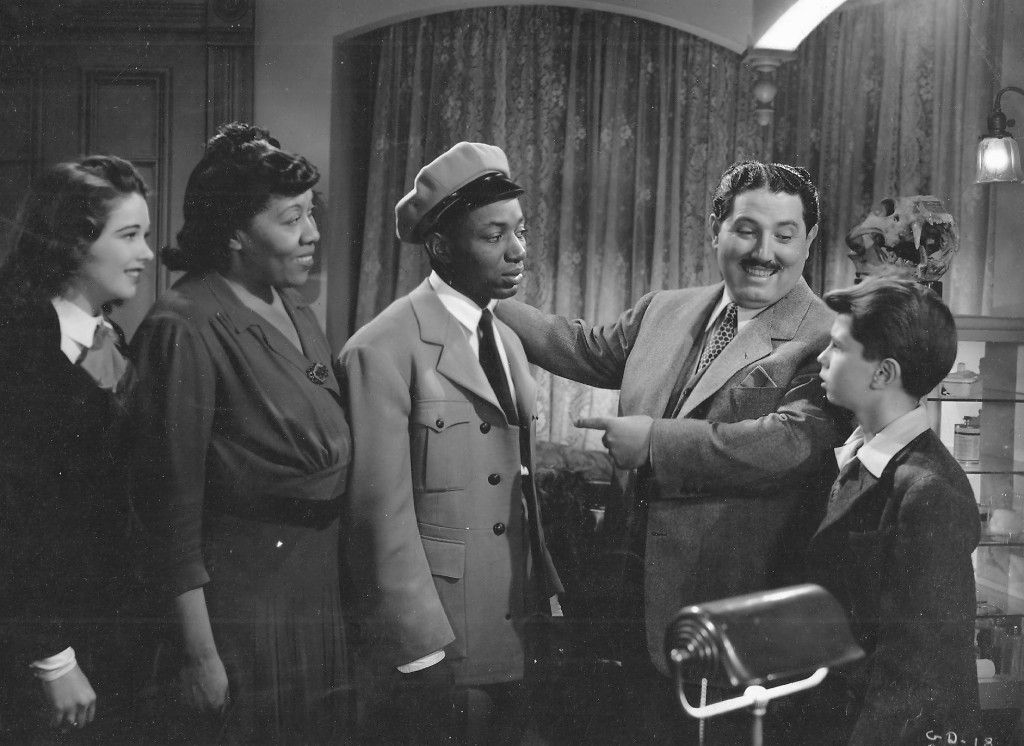

Nicodemus Stewart: His success, and that of others like Jack Benny’s Rochester–was this because radio was color blind?
My father, Nick Stewart’s, Archive of American Television interiews are at http://www.ebonyshowcase.org/nickstewart.htm
The Great Gildersleeve Movie Collection
[…] Leroy (Freddie Mercer) and housekeeper Birdie Lee Coggins (Lillian Randolph)— […]